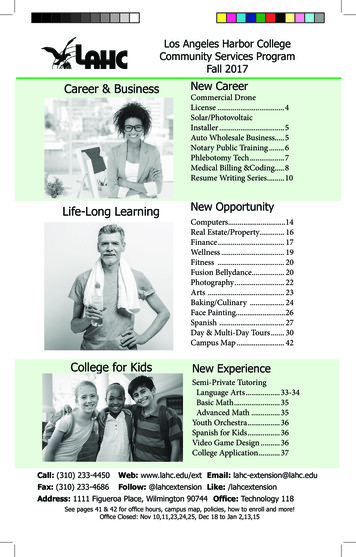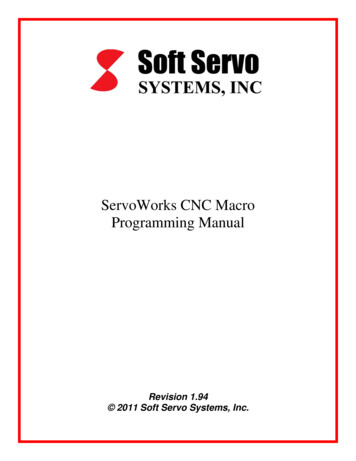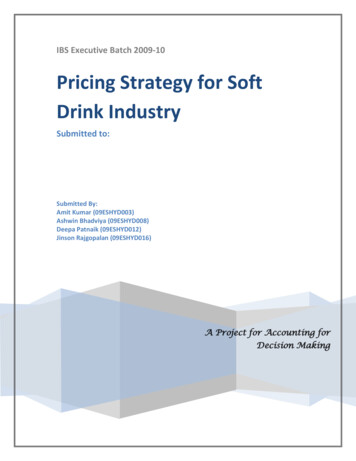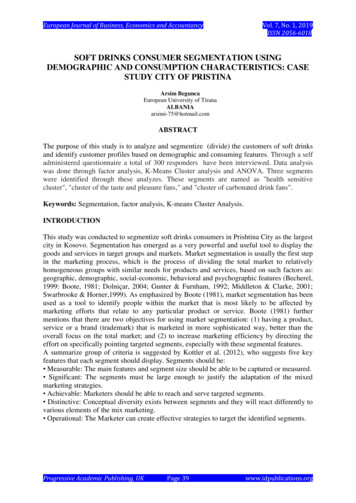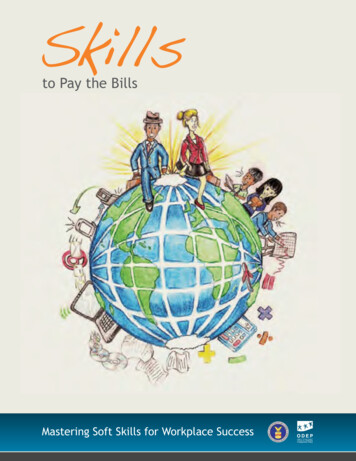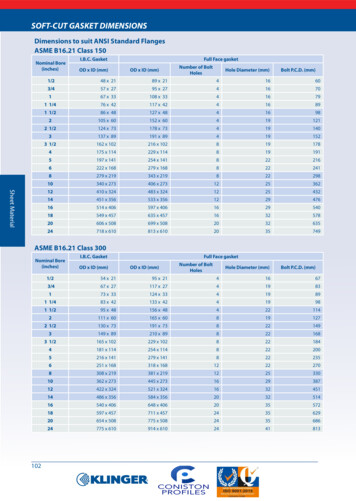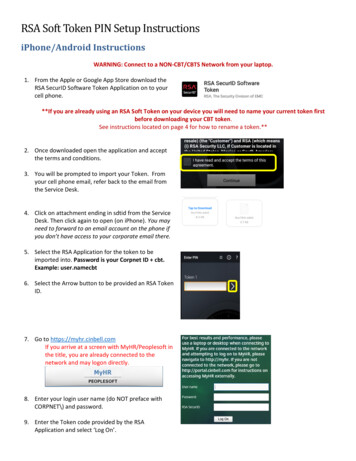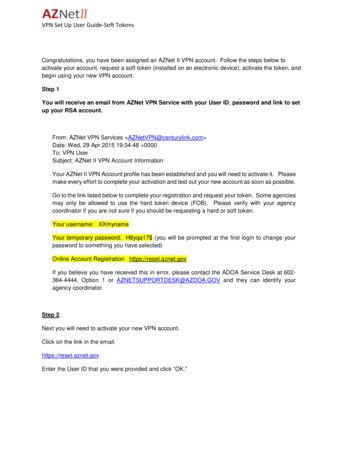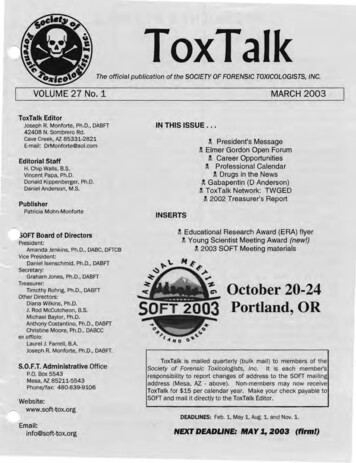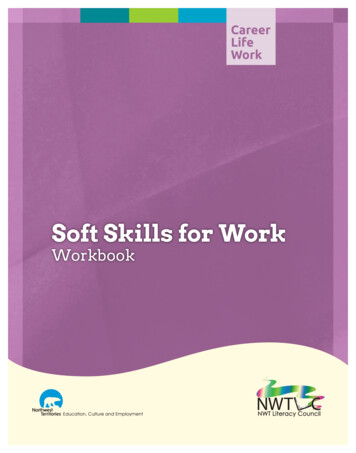
Transcription
CareerLifeWorkSoft Skills for WorkWorkbook
AcknowledgementsThe NWT Literacy Council gratefully acknowledges the financial assistance forthis project from the Department of Education, Culture and Employment,Government of the Northwest Territories.With thanks to Lisa Campbell for developing this resource for the NWT LiteracyCouncil.There are 10 manuals and workbooks in the Career – Life – Work series. Youwill find a list of them on the last page of this workbook. You can find thewhole series online at www.nwt.literacy.ca under the adult resources section.If you would like print copies, please contact the NWT Literacy Council.Box 761, Yellowknife, NT X1A 2N6Phone toll free: 1-866-599-6758Phone Yellowknife: (867) 873-9262Fax: (867) 873-2176Email: nwtliteracy@nwtliteracy.caWebsite: www.nwt.literacy.caISBN: 978-1-896472-39-3 (November 2012)
Soft Skills for WorkCareer Life WorkTable of ContentsAbout this Workbook . 2Personal Qualities. 3Get Started . 3Your Personal Qualities . 9Feeling Good About Yourself . 11Positive Affirmations . 13Being Positive . 14Code of Ethics at Work or School . 15Communication Skills . 17Test Your Communication Skills . 18Non-verbal Communication . 21Communication at Work . 23Assertive, Passive, or Aggressive? . 26Working with Others . 31Qualities of Effective Team Players . 32Top Ten Qualities of an Effective Team Player . 33Working With Others Self-Assessment . 35Consensus Building . 37Working with Others at Work . 40Working with Others in Work Situations . 42Problem Solving Skills and Decision Making . 45Decision Making . 46Problem-solving Method . 48Rate Yourself as a Problem Solver . 50Solving a Problem . 52Career - Life – Work Soft Skills for Work Workbook11
Soft Skills for WorkCareer Life WorkAbout this WorkbookWhat keeps people from getting where they want to go at work? It’s not usuallya lack of technical skills that holds them back, but rather a need to develop social,communication, and personal qualities or what we call “soft skills.”Studies tell us that employers are looking for someone who has excellent “softskills.”What are soft skills?Soft skills usually fall into four categories:2 Personal Qualities: personal qualities like feeling good about yourself andyour work, being responsible, being polite, and being motivated to do a goodjob. Communication Skills: communication skills include the ability to speakwell, listen well, give and understand instructions, and communicate in waysappropriate to the situation and audience. Teamwork Skills: teamwork skills are those needed to work well with others,to participate as a member of a team, and to resolve conflicts maturely. Problem Solving Skills: problem solving involves the identification ofproblems and the formulation and evaluation of alternative solutions byweighing risks and benefits.Career - Life – Work Soft Skills for Work Workbook2
Soft Skills for WorkCareer Life WorkPersonal QualitiesPersonal qualities are how you behave or what your personality is like. Personalqualities are important in all jobs and are one of the key things an employerlooks for when hiring.Some examples of personal qualities are: Feeling good about yourself and your work Having a good attitude Being honest Having determination Being independent Being friendly to other staff and customers Using your creativity Working hard Being loyal to your organization or company Taking initiativeGet StartedEveryone has different personal qualities. That’s what makes us unique.Employers want to know that you have certain personal qualities like the abilityto get along with others or that you are honest and trust worthy.Your Turn!Read the different scenarios on the next few pages and then determine whatskills and personal qualities the person has for the job. The first one is done foryou. You can fill in your personal profile on the last one.Career - Life – Work Soft Skills for Work Workbook33
Soft Skills for WorkCareer Life WorkJoeJoe is a builder. He has moved to Yellowknife from asmall community and is now looking for a job. He seesa job advertised in the Yellowknifer for a Carpenter’sHelper. He wants to apply.Joe’s Personal ProfileHe is strong, healthy and good at physical work. He canuse a range of different tools and maintain them ingood condition. He knows how to dig trenches, erectscaffolding and mix and pour concrete. He can prepareand clean wall surfaces for painters. He is reliable, canfollow instructions and work at a good pace. He workswell with other people and enjoys working outside.What skills and personal qualities should Joe put in his resume?Listed below are Joe’s skills and personal qualities. You can see that Joe hasmany personal qualities that make him a good employee and good worker.Skills 4use and maintain toolsdig trencheserect scaffoldingmix and pour concreteprepare surfaces for paintersfollow instructionsPersonal qualities strong and healthy good at physical work works well with other people (ateam player) enjoys working outside can follow instructions reliable can work at a good pace ambitiousCareer - Life – Work Soft Skills for Work Workbook4
Soft Skills for WorkCareer Life WorkJaneJane worked as an administrative assistant for five years. She then stayed athome to be with her children for a couple of years. She would like to apply for anadministrative assistant position at the band.Jane’s Personal ProfileShe dresses neatly and is always well presented. She isfriendly, helpful and courteous to both customers and otheremployees. She can use a range of computer applicationssuch as word processing, email and the Internet. She cantype reports and maintain files. She has good telephoneskills and is reliable with messages and othercommunication. She is very organised and careful with herwork.What skills and personal qualities should Jane put in her resume?SkillsPersonal qualitiesCareer - Life – Work Soft Skills for Work Workbook55
Soft Skills for WorkCareer Life WorkMabelMabel worked as a Community Health Representative in her community formany years. She had some training in the health field for this specific job. Shehas recently moved to Hay River and would like to pursue a career in the healthfield. She sees an advertisement for a home care aide in News North. She wouldlike to apply.Mabel’s Personal ProfileShe has experience promoting health issues and concerns in hercommunity. She is able to translate health concerns for Elders at thehealth centre. She’s good at keeping records and files organized. Shehas very good computer skills. She can make posters and typereports. Mabel is very caring and friendly and good with people. Sheenjoys helping others and is very sensitive to people’s needs. She ishard working and always on time.What skills and personal qualities should Mabel put in her resume?Skills6Personal qualitiesCareer - Life – Work Soft Skills for Work Workbook6
Soft Skills for WorkCareer Life WorkSamSam is a small engine mechanic. He has alwaysworked for himself repairing snow machines,boats and other small engines. He is tired ofdealing with his own business and now wants towork for someone else. He sees an advertisementin the paper for a small engine repair mechanicand decides to apply.Sam’s Personal ProfileSam has been working on boats and snow machines ever since he can remember.He has taken a few courses here and there on small engine repair but for themost part he knows more about small engine repair than the instructors. He isvery knowledgeable about engines and can just listen to the engine and knowwhat is wrong. Sam is a very likeable person; he is friendly to everyone andknows how to work well with others. Sam works hard and always gets the jobdone.What skills and personal qualities should Sam put in his resume?SkillsPersonal qualitiesCareer - Life – Work Soft Skills for Work Workbook77
Soft Skills for WorkCareer Life WorkYour Name:Your Personal ProfileWhat skills and personal qualities can you put in your resume?Skills8Personal qualitiesCareer - Life – Work Soft Skills for Work Workbook8
Soft Skills for WorkCareer Life WorkYour Personal QualitiesThe following checklist has been developed to help you evaluate personalqualities, which might be significant to an employer.Your Turn! Check those qualities that you feel apply to you.Friendly: Do you work well with others? Have you served on committeesat school? At work? In the community?Hard worker: Do you work hard at your job or at school? Do you put yourbest foot forward at all times?Cooperative: Do you always do your part in a team assignment? Do youoften volunteer to help?Decisive: Are you able to make clear-cut decisions under pressure?Trustworthy: Are you able to keep a secret? Do you guard confidentialmaterial carefully? Do you respect other people’s right to privacy?Efficient: Do you plan your time well? Do you consciously try to improveyour work habits?Enthusiastic: Are you interested in your work? Or studies? Have you everdone extra work because of your interest?Honest: Do you tell the truth? Do you share the praise with others? Do youaccept responsibility?Self-starter: Do you take the initiative? Do you see what needs to be doneand do it without being told?Open-minded: Are you able to accept other people’s ideas? Do you adaptwell to change?Career - Life – Work Soft Skills for Work Workbook99
Soft Skills for WorkCareer Life WorkOrderly: Do you keep things where they belong? Do you have a knack forarranging things in a logical way?Patient: Can you keep your temper? Are you able to train other workerscalmly even when you have to explain some procedures over and overagain?Punctual: Do you consistently arrive on time?Sympathetic: Do you try to understand the problems of others? Do peopleconfide in you often? Do you help them?Strong: Can you lift things that are heavy?Team-player: Do you work well with others? Can you work as part of ateam to get the job done?10Career - Life – Work Soft Skills for Work Workbook10
Soft Skills for WorkCareer Life WorkFeeling Good About Yourself1Feeling good about yourself and your positive attributes is a great way to bepositive at work.Your Turn!Write down five of your strengths, for example: friendly, happy, generous, etc.1.2.3.4.5.Write down the five greatest achievements in your life so far, like recoveringfrom a serious illness, learning to use a computer, raising your children, goingback to school, rders/self-esteem.htmlCareer - Life – Work Soft Skills for Work Workbook1111
Soft Skills for WorkCareer Life Work5.Write down five things you can do to help someone else, like taking care of theirchildren for an evening, visiting someone in the hospital, etc.1.2.3.4.5.Write down five things you can do to make yourself feel better, like calling afriend, going for a walk, having a bath, etc.1.2.3.4.5.12Career - Life – Work Soft Skills for Work Workbook12
Soft Skills for WorkCareer Life WorkPositive AffirmationsPositive affirmations are a great way to feel positive about yourself and your life.Your Turn! Complete the sentences below and then read them often!1. I am happiest when I .2. I know how to .3. Everyone thinks I am excellent at .4. I always smile when .5. Lots of people wish they could like me.6. I am a worker.7. I am a friend.8. I am a parent.9. I believe .10. I am most proud of .Career - Life – Work Soft Skills for Work Workbook1313
Soft Skills for WorkCareer Life WorkBeing PositiveBeing positive is one of the most important qualities that helps us be successfulin work, family and in our community.Your Turn!Check off the things that you would like to do to be more happy andpositive about your life. Try and check off at least two things that you will do. Write down five things that you are grateful for each night at bedtime.Write down five good things at bedtime that happened during the day.Laugh more. Read the comics each day.Stop comparing yourself to others.Focus on what you want, not on what you don’t want.Meditate for 5 – 10 minutes each day.Help others. Each day try and help at least one person. Write it down in ajournal. Start a happy journal. Write down all the great things that are happeningin your life. 14Go for a nature walk three times a week.Write down one goal for each day, then work to achieve it!Career - Life – Work Soft Skills for Work Workbook14
Soft Skills for WorkCareer Life WorkCode of Ethics at Work or SchoolWrite five statements about what is most important for you at work or at school.If being on time is very important to you, you might write a statement like this: I will be on time for work/school each day because being ontime shows respect to my co-workers, classmates, teacherand boss.If working hard is very important to you, you might write a statement like this: I will work hard at school/my job so that I can learn as muchas I can and do a good job. Working hard shows myteacher/boss that I have initiative and am interested inmoving forward in school or my job.Your Turn!1.2.Career - Life – Work Soft Skills for Work Workbook1515
Soft Skills for WorkCareer Life Work3.4.5.16Career - Life – Work Soft Skills for Work Workbook16
Soft Skills for WorkCareer Life WorkCommunication SkillsThe number one skill that employers are seeking is good communication skills.The most surprising thing is that we are not taught communication skills inschool.We all need to learn to communicate effectively, with our families, friends, atwork and in the community. When we speak clearly and listen to others we areable to get our message across in a way that people understand.One definition for communication skills is below:Communication skills is the set of skills that enables a person to conveyinformation so that it is received and understood. Communication skillsrefer to speaking, listening, writing, presenting, and body language.So how do you measure up? Go through the activities in this section to rate yourcommunication skills and learn ways to improve them.Career - Life – Work Soft Skills for Work Workbook1717
Soft Skills for WorkCareer Life WorkTest Your Communication Skills2Your Turn!Fill in the chart below and tally up your communication score at the end.OftenSometimesNever1. I can detect the mood of others bylooking at them when we talk.2. I can tell when someone doesn’tunderstand what I am saying.3. I am able to discuss issues withoutgetting upset.4. I find it easy to understand someoneelse’s point of view.5. When talking to people, I pay attentionto their body language.6. When I am angry, I admit it.7. I express my ideas clearly.8. I change the way I talk depending onwho I’m speaking to.9. I express my opinions even if others donot agree.218http://www.queendom.com/queendom tests/transferCareer - Life – Work Soft Skills for Work Workbook18
Soft Skills for WorkCareer Life Work10. I can talk about my feelings.11. When I know what someone is going tosay I finish the sentence for them.12. I have difficulty putting my thoughtsinto words13. I fidget while listening to someone talk.14. People don’t understand what I amtalking about.15. I find it hard to express my feelings toothers.16. People tend to misinterpret what I say.17. I have to repeat myself often becausepeople don’t understand what I amsaying the first time.18. I find it difficult to understandsomeone when they have a differentpoint of view from mine.19. If I have something relevant to add, I'llinterrupt someone to make certain myviews are heard.20. When other people become emotionalaround me, I’m not sure how to react.21. If I find a conversation boring, I’ll letmy mind drift away.22. I will stop a speaker in mid-sentence ifI disagree with a statement he or sheCareer - Life – Work Soft Skills for Work Workbook1919
Soft Skills for WorkCareer Life Workhas made.23. People complain that I don't appear tobe listening when they speak to me.24. I tend to do most of the talking inconversations.25. I find myself struggling to find theright words to express myself.Calculate your score!Questions 1 - 10Questions 11- 253 points for Often0 points for Often2 points for Sometimes2 points for Sometimes0 points for Never3 points for NeverTotal ATotal BTotal A plus Total B 50 - 75: You are an excellent communicator!25 - 50: You have fairly good communication skills but still need somehelp.0-25: You need some help with your communication skills!20Career - Life – Work Soft Skills for Work Workbook20
Soft Skills for WorkCareer Life WorkNon-verbal Communication3It is important to communicate well at work. You often send messages throughyour tone of voice, facial expressions or body language.Your Turn!Read the following situations and write down what you think are the possiblemessages that are being sent.1. A customer approaches the counter where you are standing. You greet thecustomer by smiling and saying, “Good morning.” The customer does notlook at you or respond to your greeting.2. As you approach a table of two in your restaurant, you notice one of thecustomers looking at his watch. His movements appear hurried and he istalking very quickly.3. You greet your boss and she smiles back at you.3Ready to Work North Workbook (p.137)Career - Life – Work Soft Skills for Work Workbook2121
Soft Skills for WorkCareer Life Work4. You ask a customer how her meal was and she says, “OK,” with a strangelook on her face.5. Four customers are sitting at the bar laughing and talking loudly.6. You come in late for work and you say hello to your boss. He grunts a quickgreeting and then returns to his work.7. You forgot to turn off a valve at work. Your co-worker comes in and turns offthe valve and then grins and shrugs his shoulders.22Career - Life – Work Soft Skills for Work Workbook22
Soft Skills for WorkCareer Life WorkCommunication at Work4Workers in any job situation need to have good communication skills. You maybe working with the public or working on a team to get a project done. You needto be able both to listen and communicate your ideas so that work gets done oryour customer is happy. Sometimes good communication skills can mean lifeand death depending on what you are communicating!Your Turn!Read each scenario and each statement. Decide if each statement shows good orpoor communication skills. If you identify that the statement uses poorcommunication skills, write a statement that would improve it.1. Your co-worker politely asks you to help clean up a mess that another coworker made. You return to your own tasks, making the following statement:“It’s not my fault the mess was made and I can’t help clean up right now anywaybecause I don’t have time.”Good communication skillsPoor communication skills4Read to Work North Workbook (p.135)Career - Life – Work Soft Skills for Work Workbook2323
Soft Skills for WorkCareer Life Work2. You are trying to explain where the supply room is located to a newly hiredemployee who does not understand English well. You show him by pointingwith your right hand as you say very loudly:“You have to turn right at the end of the hall.”Good communication skillsPoor communication skills3. A customer is checking in at the hotel where you work. You pass her a formto fill out and say:“Please fill in the top part of the form, dear.”Good communication skillsPoor communication skills4. As a customer is leaving, you say the following with a smile and a wave:“Thank you for coming in and I hope to see you again.”Good communication skillsPoor communication skills24Career - Life – Work Soft Skills for Work Workbook24
Soft Skills for WorkCareer Life Work5. You need to talk to the hotel manager about booking several rooms for aconference. You ask to speak to the manager, but you are told that she is awayon vacation for two weeks. You sigh and say:“Well I really need to talk to someone in charge about booking some rooms. Whoshould I speak to?”Good communication skillsPoor communication skillsCareer - Life – Work Soft Skills for Work Workbook2525
Soft Skills for WorkCareer Life WorkAssertive, Passive, or Aggressive?There are three common ways that people respond to difficult situations.1. Assertive behaviour is described as the ability to stand up for your rightsin a way that does not hurt the rights of others. Being assertive is theability to communicate your opinions, needs and ideas in a confident anddirect way.2. Passive behaviour is when you don’t stand up for your rights. You don’texpress your feelings and opinions. You apologize for things that are notyour fault and you avoid conflict at all costs.3. Aggressive behaviour is when you don’t respect the rights of others. Younever apologize and you don’t listen to other opinions. You are alwaysright and you respond quickly to situations where you feel you have beenwronged. You blame others.What do these behaviours look like?Here are some common scenarios, with examples of each style of behaviorScenario A: Someone cuts in front of you at the supermarket.Aggressive response: You assume they did it on purpose and youangrily say, “Hey, jackass, no cuts!”Passive response: You let the person stay in front of you.Assertive response: You assume that they may not have seen you inline, and politely say, “Excuse me, but I was in line.”26Career - Life – Work Soft Skills for Work Workbook26
Soft Skills for WorkCareer Life WorkScenario B: Your friend, who talks a lot, calls to vent about her badday. Unfortunately, you have a lot of work to do and don’t have timeto talk.Aggressive response: You become angry that she obviously doesn’trespect your time, cut her off, and sarcastically say, “Oh, get over it! Ihave my own problems!”Passive response: You let her talk for as long as she needs, and figurethat your deadline can suffer; she needs your help.Assertive response: You listen for a minute or two, thencompassionately say, “Wow, it sounds like you’re having a tough day!I’d love to talk to you about it, but I don’t have the time right now.Can we talk later tonight?”Your Turn!Read each statement and decide if the behaviour is aggressive, passive orassertive.1. Someone cuts Judy off in traffic and she yells and makes rude handgestures at them.2. Jim thinks the cashier at the grocery store didn’t give him correct change.Jim walks away with 10 less than he thinks he should have.Career - Life – Work Soft Skills for Work Workbook2727
Soft Skills for WorkCareer Life Work3. Jim’s friend Kyle borrowed his shirt last month. Jim has asked himrepeatedly to give the shirt back, but Kyle keeps forgetting. Jim calls Kyleand offers to come by his house to get the shirt.4. Jim is at a friend’s house with a group and they all want to see a horrormovie. Jim doesn’t like horror movies, but he doesn’t want to upset hisfriends. He stays and watches the movie, even though it scares him.5. Judy and Michael have been dating for a while and always go out to eaton Saturday nights. Michael always asks Judy which restaurant she’d liketo eat at, and she always says, “Wherever you’d like to go is fine with me.”6. Jim has been dating his girlfriend Carrie for several months and cares a lotabout her. At a party, Jim sees her kissing another guy. Jim gets angry andbegins yelling at Carrie and hitting the other guy.Answers1. Aggressive2. Passive283. Assertive4. Passive5. Passive6. AggressiveCareer - Life – Work Soft Skills for Work Workbook28
Soft Skills for WorkCareer Life WorkYour Turn!Get the idea? Now it is your turn. Read the scenarios below and write what anaggressive, passive and assertive response would be.Scenario One: Your boss has asked you to mop the floors. You startmopping them. Ten minutes later he comes and says rather meanly that hewould like you to shovel the front walkway.Aggressive response:Passive response:Assertive response:Scenario Two: You bring your car to a garage for service. You ask themechanic to call and let you know how much it will cost before doing thework. He doesn't call and when you call him he tells you he has already donethe work and your bill is 450.Aggressive response:Passive response:Assertive response:Career - Life – Work Soft Skills for Work Workbook2929
Soft Skills for WorkCareer Life WorkScenario Three: You go to a party with some people but the person who isdriving had too much to drink and refuses to let anyone else drive.Aggressive response:Passive response:Assertive response:Scenario Four: Your co-worker always asks to borrow a few dollars at luncheach week, but he rarely pays you back. You are beginning to resent him.Aggressive response:Passive response:Assertive response:30Career - Life – Work Soft Skills for Work Workbook30
Soft Skills for WorkCareer Life WorkWorking with OthersRemember what you learned in kindergarten? How well do you play withothers? How well do you work with others? Because, for most of us, work is ahuge part of our daily life, it is essential to have good relationships at work.Sometimes, this can be very challenging.Our “people skills” are learned. We gather them throughout our lives throughthe relationships we watch and engage in. Sometimes we get lucky and we havegreat role models. Usually, we don’t. Then, we feel anxious, stressed, conflictedand overwhelmed when we are faced with difficult people, situations andcircumstances.The good news is that working with others is a skill you can learn. The followingactivities will help you assess your “working together” skills and give you ideasof how you can be a better team member.Career - Life – Work Soft Skills for Work Workbook3131
Soft Skills for WorkCareer Life WorkQualities of Effective Team PlayersWhat are some qualities of an effective team player? For example: friendly,cooperative, hard workerYour Turn! Work with a partner and brainstorm as many qualities as you canthink of.For example: friendly,Compare your list with the Top Ten Qualities of an Effective Team Player (nextpage).32Career - Life – Work Soft Skills for Work Workbook32
Soft Skills for WorkCareer Life WorkTop Ten Qualities of an Effective Team Player51. ReliableGood team members are reliable and consistent.2. Good CommunicatorGood team members express their thoughts and ideas clearly, directly,honestly, and with respect for others and for the work of the team.3. Good ListenerGood listeners are essential for teams to function effectively. Teams needteam players who can absorb, understand, and consider ideas and pointsof view from other people without debating and arguing every point.4. EngagedGood team players are active participants. They come prepared for teammeetings and listen and speak up in discussions. They're fully engaged inthe work of the team and do not sit passively on the sidelines.5. Shares their IdeasGood team players share their ideas. They're willing to share information,knowledge, and experience.6. CooperatesCooperation is the act of working with others and acting together to getthe job done. Good team players figure out ways to work together to solveproblems and get work alities-of-an-effective-team-player.htmlCareer - Life – Work Soft Skills for Work Workbook3333
Soft Skills for WorkCareer Life Work1. FlexibleGood team players roll with the punches
Skills Personal qualities Soft Skills for Work Career - Life – Work 6 Mabel Mabel worked as a Community Health Representative in her community for many years. She had some training in the health field for this specific job. She has recently moved to Hay River and would like to pursue a career in the health field.File Size: 2MB
